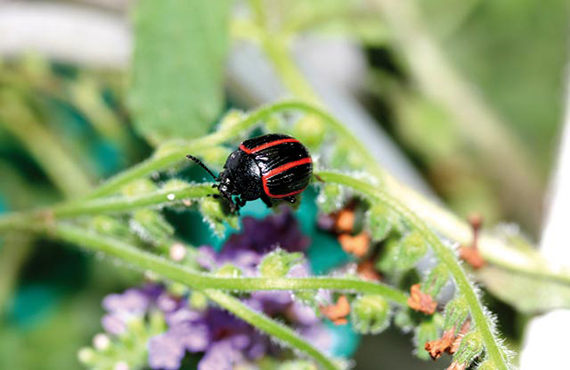
About weed biological control

Biological control (biocontrol) involves the introduction of natural enemies (insects, mites and pathogens) of a target weed that will reduce the density of the weed to a level that is acceptable and that will maintain the weed density at that level. It is an economical, self-sustaining and environmentally-friendly management technique. Biocontrol does not eradicate weeds, but can reduce populations to acceptable levels, or suppress them to levels where they can be controlled in combination with other methods.
Two main biocontrol techniques are used:
- Classical biocontrol. This is the most commonly used technique and involves the introduction of natural enemies from their native range into an exotic range where their host plant has become a weed. This approach creates a natural, self-sustaining balance between the weed and its control agent, similar to that found in the weed's native range.
- Non-classical biocontrol. This includes Innundative (releasing large numbers of the agent to control the weed e.g. mycoherbicides) and Augmentative approaches (mass rearing and release of large numbers of a control agent that cannot be utilised as a mycoherbicide).
When a biocontrol agent’s population establishes, control becomes self-perpetuating and self-regulating as the agent becomes part of the region's ecology. Monitoring an agent's population dynamics and impact is an important part of a biocontrol strategy.
If successfully introduced, biocontrol agents can assist in reducing weed abundance, density and impact. However, successful programs may take 10 or more years to be effective, and results may vary from area to area.
Biocontrol is practical and effective for;
- grazing areas
- inaccessible areas such as timbered, rocky and steep locations
- areas of low-priority for other forms of control
- situations where biocontrol is the only option, for example sensitive aquatic or environmental areas
- situations where chemical control may be too expensive or not effective.
NSW DPIRD staff are involved in the biocontrol of several environmental and agricultural weeds. We are currently developing and expanding biocontrol throughout NSW and a state-wide extension of the Biological Control Taskforce. New South Wales’ first insect biocontrol quarantine facility at the Orange Agricultural Institute (OAI) has been certified and is operational.
NSW DPIRD provides biocontrol rearing facilities and training at their Grafton and Orange laboratories.

